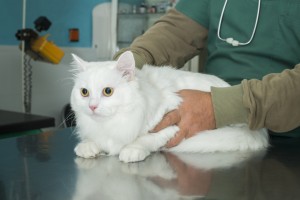 Giardia in cats is one of those nasty parasitic conditions every pet parent hopes they never have to deal with. In reality, it’s not too difficult for your cat to pick it up, particularly if he or she has free access to the outdoors.
Giardia in cats is one of those nasty parasitic conditions every pet parent hopes they never have to deal with. In reality, it’s not too difficult for your cat to pick it up, particularly if he or she has free access to the outdoors.
Giardia is a microscopic intestinal parasite that your cat gets from contact with the infected feces of another animal, not necessarily a dog or another cat. She can pick it up from contact with contaminated soil; drinking water from a contaminated pond, creek or puddle; or licking herself after squeezing through a gap in the fence where an infected animal has passed.
Symptoms of Giardia in Cats
So how do you know if your cat acquires this infection? While it’s possible for him to have no symptoms whatsoever, there’s a good chance he will exhibit at least some of these signs:
Diarrhea
If your cat suddenly starts to have more frequent bowel movements, or you notice that his feces is more watery than usual, it could be the beginning of acute diarrhea. He might also have accidents in places other than his litter box, which is a common way for cats to try and show you something is wrong.
Abdominal Pain and Bloating
The first signs of pain are usually listlessness and a lack of interest in food, but if you think your cat suddenly seems plumper than usual, it could be an indication of abdominal bloating. If her abdomen seems to have become enlarged over a short period of time, you should get a medical checkup. Likewise, if this is accompanied by other signs, it may be more than just ‘picking up weight.’
Vomiting
We’re so used to cats throwing out the odd hairball or two, we often don’t pay attention when a cat vomits. If you notice your cat vomiting more than once in a day, or her vomiting is accompanied by diarrhea or large amounts of gas, it’s likely to be more than just a hairball.
Nausea
If your cat feels nauseous, he may not actively be vomiting but will most likely be uninterested in food. You might find him spending more time sleeping or showing less enjoyment for playing or going outdoors. These are signs you should take note of and consider bringing to the attention of your veterinarian.
Weight Loss
It’s great if your cat is on a diet and losing weight slowly and steadily, but undiagnosed giardia can result in sudden weight loss. The reason for this is that the parasites attach themselves to the cat’s intestine, where they multiply and absorb the nutrients from the food she eats and her bloodstream. Your cat ends up suffering from a lack of nutrients, and loses muscle mass.
Left untreated, giardia can cause your cat significant health problems, and since it’s not that easy to spot, your best option is to prevent it in the first place. Get a stool sample tested once a year as part of your pet’s preventive care and general wellness program (or twice yearly if you have an outdoor cat). And don’t wait to get attention if you see early warning signs that something is wrong. It could be more serious than you think!

